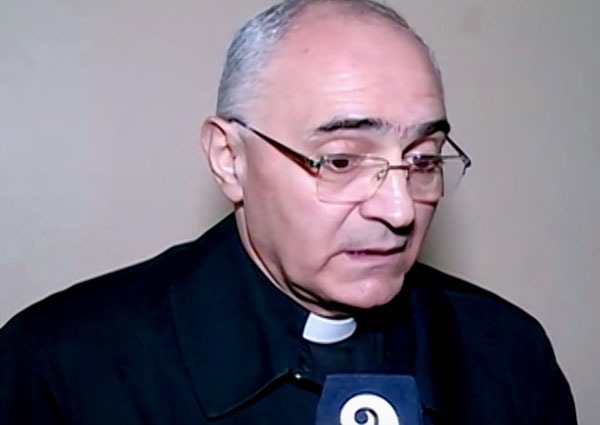Vatican Envoy Sent to Probe Paedophilia Cover-up Criticises ‘spiteful’ Children
Buenos Aires Herald
In an interview addressing scandal in Mendoza, Father Dante Simon talks of kids who ‘fall in love with a priest’ and are rejected A Vatican envoy sent to investigate a shocking paedophilia cover-up at the Antonio Provolo Institute for deaf children in Mendoza province — where priests and employees have been accused of the systematic sexual abuse of minors over decades — has sparked outrage after describing some of the children who laid claims as “spiteful.” Father Dante Simon, one of the two envoys sent by the Vatican to probe the scandal, suggested that some accusations have been dismissed because they were invented by “spiteful” boys who had fallen in love with priests and were rejected. Despite the fact that more than 60 former students have come forward with allegations involving sexual abuse at the institute, Simon chose to highlight “dismissed” cases. “A few (cases) have been dismissed,” the priest told the Mendoza Post. “Because there are people who are spiteful. For example, a girl or a boy falls in love with a priest, and he doesn’t respond back. The boy can be very spiteful like a woman can. So, they denounce him (the priest),” Simon told reporter Martin Tejerina. The envoy has spent the past few weeks in Mendoza to investigate the incidents that occurred in the Antonio Provolo Institute in Lujan de Cuyo, Mendoza. Simon was accompanied by Juan Martinez to lead an investigatory commission. The envoy tried to arrange a meeting with both the victims and family members who have accused the priests and employees at the institute of abuse, but the envoy’s requests were rejected unanimously. One of the victims is reported to have tried to commit suicide after she learned that the Vatican envoy had travelled to Mendoza to investigate the case. According to a lawyer for the victims, Sergio Salinas, Simon’s statements had caused an emotional crisis after the envoy had implied some of the abuses may not have taken place. More than 60 former students have come forward, saying they were sexually abused at the hands of priests Nicola Corradi and Horacio Corbacho, altar boy Jorge Bordon, and two administrative employees Jose Luis Ojeda and Armando Gomez. A nun, Kosaka Kumiko, was also recently implicated in the scandal. According to news reports, when a five-year-old girl was sexually assaulted by a priest, Kumiko allegedly forced her to wear a diaper in class, to conceal the bleeding. Other victims have accused the nun of actively participating in the abuse. Corradi has a history of sex abuse allegations that date back long before Mendoza. Italian judicial authorities had been seeking to prosecute him for a series of sex abuse cases in Verona, Italy, that occurred decades ago. The priests stand accused of raping, sexually abusing and fondling the students in bathrooms, dormitories, garden and basement at the school. One of the alleged victims told the Associated Press that she witnessed how a girl was raped by one priest while the other one forced her to give him oral sex. The victims have also requested that Bishop Sergio Buenanueva give testimony about the case. The bishop said in a recent interview with Telam that “one of the greatest errors” of the Argentine Church was to protect priests that are abusers. Rights groups criticise declassiciation attempt The Episcopal Conference has published a long-awaited protocol allowing victims of the last military dictatorship (1976-1983) or their family members to access archives pertaining to that dark period. The announcement comes seven months after the Argentine Synod (CEA) and the Vatican published a joint press release stating that they had “finished the cataloging and digitalisation of the archive material.” Access to the Catholic Church’s documents is highly restrictive. Only victims, family members of detained and forced-disappeared victims, and bishops can request information. The only archives they can request, however, are those in which the name of the victim sought after is mentioned. Those interested have to complete and submit a request to the Secretary General of the Argentine Synod (CEA), which has the authority to reject the request outright. Many human rights groups weren’t happy with the new protocol. Though the Grandmothers of the Plaza de Mayo, for example, praised the CEA’s gesture, they criticised the rules for being extremely restrictive. “Through this method, they will give bits of information to each family... with a filter from the CEA beforehand, which means they also won’t give information linked to the global intervention by the Catholic Church’s embers to the last military dictatorship,” said the organisation.
|
.
Any original material on these pages is copyright © BishopAccountability.org 2004. Reproduce freely with attribution.
